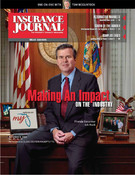 Despite the uncertainty over who will be the next governor of California, the state’s next CEO will have to deal with groundbreaking insurance legislation that will be crafted, debated and implemented over the next several months and into 2004. Implementation of California’s new privacy law, overhauling the state’s workers’ compensation system, and the ongoing debate over insurers’ use of loss data history reports and credit-based insurance scores are just a few of the issues that the new governor will be confronted with upon taking office.
Despite the uncertainty over who will be the next governor of California, the state’s next CEO will have to deal with groundbreaking insurance legislation that will be crafted, debated and implemented over the next several months and into 2004. Implementation of California’s new privacy law, overhauling the state’s workers’ compensation system, and the ongoing debate over insurers’ use of loss data history reports and credit-based insurance scores are just a few of the issues that the new governor will be confronted with upon taking office.
Of course, the governor will also have to deal with a huge deficit, a sagging economy, the downgrading of the state’s bond rating to near junk status, and a failing school system. Considering the state of the state, it’s a wonder that 135 people actually want the job.
When it comes to insurance issues, the governor’s authority is somewhat limited because the state’s insurance commissioner is elected. The commissioner can avoid the legislative process by enacting regulations—and challenging those who oppose such rules to contest them in court. In addition, the popularity of ballot initiatives can serve to both undermine the legislative process and serve as a spark to motivate lawmakers—including the governor—to act. That is precisely what occurred during the recent debate over the privacy bill. Had state legislators failed to pass a new law, the issue would have been placed on the March 2004 ballot, leaving the outcome to be determined by who could develop the most distinctive sound bite and who could afford to purchase the most advertising.
Despite the flaws in the political system, the new governor will still have an important role in rejuvenating the state’s economy and supporting a regulatory system that fosters competition in the insurance marketplace based on price, coverage, and customer service.
Challenges wait ahead
The first challenge likely to be faced by the next governor will be workers’ compensation reform.
Medical costs in California are among the highest in the nation, and increases far outpace both the national average for workers’ compensation and overall health care costs. No comprehensive, workable solution has yet been brought forward to address escalating health care costs. A bipartisan California Legislative Conference Committee has been challenged with developing a legislative solution to repair the workers’ compensation system. A proposal was expected to be put forward by Sept. 5.
The new governor should make such reform his or her first priority. Governor Schwarzenegger, Bustamante, Ueberroth, McClintock or Huffington should demand that any legislative solution address spiraling medical costs by providing a comprehensive fee schedule, an independent medical review system, reduction in litigation-driven costs, and a utilization management system. The governor has an important role in challenging the Legislature to display the resolve to make the changes necessary to bring medical costs in line with other states.
When it comes to homeowners insurance issues, we suggest that the new governor work with the insurance commissioner, insurers, consumers and legislative leaders to develop solutions that will enhance a more competitive insurance market while preserving company solvency. Loss costs, driven by a spike in water damage claims, litigation costs, escalating home repair costs, and increased home values, have soared since the late 1990s. California has experienced a near 110 percent increase in water-related claims in five years.
Cost of home repair and soaring property values in California has also had an impact. While the Consumer Price Index increased by 8.4 percent from 1990 to 2000, the cost of home repair in the state escalated by 17.3 percent during the same period. Insurance rates are impacted by the rapid rate of refinancing, higher building material costs and equity loans that have spurred higher demand and higher prices for qualified construction contractors.
Given California’s long list of problems, neither insurers nor voters should expect the new governor to repair the workers’ compensation system, resolve homeowners’ insurance issues, or rejuvenate the economic climate overnight. However, the new governor can take important steps to restore Californians’ faith that such solutions can be achieved by outlining a plan to address these issues soon after the election results are in.
Sam Sorich is president of the Association of California Insurance Companies (ACIC), an affiliate of the National Association of Independent Insurers (NAII). Sorich had been lobbying for the NAII in Sacramento for nearly 20 years before taking on his dual rule as ACIC president in October 2002. He also continues to serve as vice president and western regional manager of NAII, responsible for NAII’s regulatory and legislative activities in Arizona, Oregon, Alaska, Hawaii and Nevada.
Was this article valuable?
Here are more articles you may enjoy.


 Nine-Month 2025 Results Show P/C Underwriting Gain Skyrocketed
Nine-Month 2025 Results Show P/C Underwriting Gain Skyrocketed  Zurich Insurance’s Beazley Bid Sets the Stage for More Insurance Deals
Zurich Insurance’s Beazley Bid Sets the Stage for More Insurance Deals  What Analysts Are Saying About the 2026 P/C Insurance Market
What Analysts Are Saying About the 2026 P/C Insurance Market  Maine Plane Crash Victims Worked for Luxury Travel Startup Led by Texas Lawyer
Maine Plane Crash Victims Worked for Luxury Travel Startup Led by Texas Lawyer 


